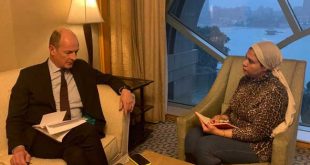Kamal Amer, head of parliament’s Defence and National Security Committee, tells Gamal Essam El-Din that extending the state of emergency was necessary to help the army and police defeat terrorist movements.
Gamal Essam El-Din – Al-Ahram Weekly
On Sunday a majority of MPs voted in favour of the latest three-month extension to the state of emergency which has been in force since April 2017 when two church bombings claimed 45 lives.
Before the vote Prime Minister Mustafa Madbouli promised any exceptional measures taken would strike a balance between public freedom and the demands of national security.
Kamal Amer, a former chief of Egypt’s Military Intelligence and head of the Third Field Army, tells Al-Ahram Weekly why he believes extending the state of emergency is in the national interest.
How do you view parliament’s approval of the new declaration of the state of emergency?
Parliament’s General Committee issued a report saying the extension was necessary for three reasons. First, emergency measures over the last 18 months have proved an effective tool in defeating terrorist organisations. They give security forces the powers necessary to launch preventive attacks against these organisations and thwart their schemes to destabilise Egypt. Second, they allow the state to pursue development programmes in a climate of stability. You cannot boost economic growth and improve living conditions of citizens without stability. Third, emergency provisions aid the authorities in stemming the infiltration of terrorist organisations targeting Egypt and help them to reveal the sources of funding of these organisations and whether they have contacts with any foreign elements.
In his statement before parliament Prime Minister Mustafa Madbouli said the state of emergency underpins Comprehensive Operation Sinai 2018. How do you evaluate the counter-terrorist campaign nine months after it started?
It is not confined to defeating terrorism in North Sinai but extends to safeguarding Egypt’s eastern borders with Gaza, western borders with Libya and the southern borders with Sudan and other African countries. All military units participate in the operation, alongside the police.
It has been able to stem the infiltration of foreign terrorist elements and weapons into Northern Sinai via land and sea. Terrorists were coming from Libya and Gaza to kill Christians, bomb churches and carry out other operations against civilians. This infiltration has almost come to an end thanks to the emergency measures and the bravery of military and security forces.
So is Comprehensive Operation Sinai 2018 over?
No. Not yet. Yes, it has broken the back of terrorist movements there and blocked their access to money, weapons and the other elements necessary to attack security forces. But the campaign always had two objectives. The first is to defeat terrorism completely and eliminate the threat it poses. The second is to promote real economic development in Sinai. The two objectives are now being pursued in parallel.
How did so many terrorists and such huge quantities of weapons turn up in North Sinai?
The infiltration of Sinai was facilitated by Hamas in Gaza. Hamas had recruited jihadist movements to help it in its resistance war against Israeli occupation. These movements included the Islam Supporters Army led by Abdel-Latif Moussa, and the Army of Islam led by Momtaz Daghmash. In 2008 these Salafist Jihadist movements began to infiltrate North Sinai via underground tunnels. Later they moved to recruit local residents to swell their ranks and turn the area into a Northern Sinai emirate that would target the Egyptian army. They received funding and weapons from foreign intelligence agencies. There was also infiltration from the Western border with Libya and southern border with Sudan which hundreds of volunteer jihadists crossed carrying sophisticated weapons.
How effective has legislation passed by parliament been in combating terrorism?
Legislation can help eliminate the phenomenon of terrorism but it is a long-term process. We need a comprehensive strategy to counter the extremist thought that feeds the proliferation of terrorist movements.
It is important in the coming stage to focus on reforming religious discourse. Political parties should play a role in this respect, alerting the attention of young people to the dangers posed by extremist groups. Al-Azhar and the Ministry of Waqf [Religious Endowments] must play a leading role in exposing the false ideologies of extremist and jihadist groups.
The Defence and National Security Committee proposed a law making the army and security forces responsible for safeguarding strategic buildings and installations. The law, which was approved by parliament, allow those who attack these installations to be referred to trial before military courts. The committee also helped parliament pass legislation sequestrating the funds and assets of terrorist-designated movements.
We hope that in the current session of parliament amendments to the Criminal Procedures law will be passed, speeding up the trial of individuals involved in terrorist activities.






